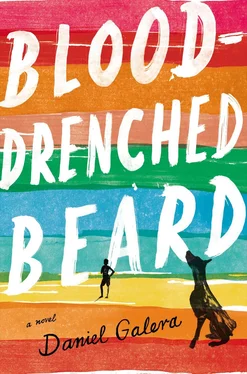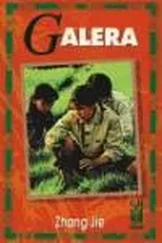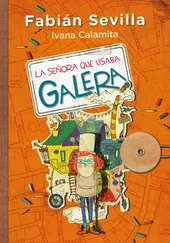The third-to-last attraction of the evening, before the pagode music band and the much-awaited sentimental pop duo Claus & Vanessa, is the folk singer Índio Mascarenhas. The man who climbs onto the stage must be in his early sixties. He is wearing black bombacha pants, brown boots, a red handkerchief, and a gaucho hat. Even from afar his indigenous features and solid jaw are striking. A diagonal beam of light exposes his deep wrinkles, like scars. There is an abundance of cartilage in his broad, pockmarked nose and ears. His skin is the color of wood and looks like it is wood. There is no band, just the man and his guitar. Instead of singing, he launches into an interminable speech about his journey as an artist.
I play a different kind of music, from my part of the country, Uruguaiana. ’Round here, you folk listen to music with more of a dancy feel to it. Forgive me, but I’m more of a savage. My hat is different from yours — the brim is broader. Across the road from my house is a church, with a bar on one side and a whorehouse on the other, and I feel happy in all three places.
The audience in the square isn’t very enthusiastic about Índio Mascarenhas and starts to disperse. Some teenagers start to curse him. But he is drawn to the figure of the singer and moves closer to the stage. The sob story goes on for several minutes and is self-centered and narcissistic, but it is also sincere and filled with a touching naïveté. The man claims to be tough but seems fragile and exposed. There is an ancestral purity about him. His repetitive speech doesn’t come to any kind of conclusion, but he is suddenly satisfied and starts to play. His amped-up guitar is out of tune, and the volume is much higher than it should be, which distorts the sound and makes the amplifiers crackle. Índio Mascarenhas never plucks his instrument. He just strums the strings with a quick, percussive beat that never stops while the fingers of his left hand get tangled in chords that barely sustain the melody. His voice is deep and beautiful but nothing extraordinary. It is his attitude and way of playing that are hypnotic. His father used to have a lot of old records of folk music, and he grew up listening to gaucho classics, but this rustic, somewhat improvised sound is different.
After finishing his first song, as he receives a mixture of applause and booing from the remaining audience, Mascarenhas looks into the crowd and suddenly gives a start, a look of surprise on his face. The singer squints at him, then opens his eyes wide and raises his eyebrows as if he has just seen a ghost.
After the show, he sees Mascarenhas leaning on the counter of a drink stand and walks over. At close range the singer reeks of sour sweat, and it makes him feel dizzy. The singer is drinking cachaça out of a plastic cup. His wide-brimmed hat is on the counter, and his thick hair, a mixture of black and white, is greasy and stuck to his scalp. By his side is a girl of about thirteen with black hair tied up in a ponytail, big, inquisitive eyes, and indigenous features. He is talking to a short man who is also wearing bombachas and a brown leather jacket over a long-sleeved shirt. When he sees him approaching, Mascarenhas looks him up and down and goes back to talking to the short man in an attempt to pretend he didn’t recognize him earlier. Nevertheless he stops in front of the singer and greets him. Mascarenhas’s reply is accompanied by a gust of bad breath that could knock a man down, and his olfactory aggression brings back a detail of his last conversation with his father. The intervening decades apparently haven’t diminished the problem at all. To make things worse, Mascarenhas is smoking a hand-rolled cigarette and chewing on handfuls of peanuts from a bowl on the counter.
I really liked your show, he says, holding out his hand.
The singer receives the compliment with his massive, rock-hard hand and smiles.
Thanks, kid.
Without further ado, in his warm voice made hoarse by an incessant regime of boiling-hot maté and hand-rolled cigarettes, Mascarenhas goes straight to the point.
Kid, you look just like a guy I met here in Garopaba many years ago.
Índio’s been coming to play here since the sixties, says the short man. This guy here’s got stories to tell!
Man, did you give me a fright, Mascarenhas goes on. I thought you were a ghost.
Did you think I was Gaudério?
Mascarenhas frowns and turns his head to one side theatrically. Whoa, he says, and then is unable to say anything else and eats another handful of peanuts.
I’m his grandson. My dad told me about when you met. You guys had a run-in, didn’t you?
We did. A run-in, yep, we did. Well, I’ll be. It’s been a long time. This fair was no more than two stalls and a low stage in the church hall.
The girl tugs on Mascarenhas’s sleeve.
What’s up, my princess? Hey, this is my daughter. Noeli. She’s a bit skittish. She’s traveling with her dad, ain’t ya? What do you want, my little swamp rose?
The girl asks her dad for some money to go and buy a candy apple on the other side of the square. The short man jumps in, takes a wad of notes from the pocket of his bombachas, and gives the girl five reais . She thanks him timidly and leaves holding the notes with both hands.
Go around the outside where there ain’t as many people! the singer shouts. The crowd has been growing constantly since the beginning of the pagode concert.
What an adorable girl, says the short guy.
The kid’s never left Bagé before, says Mascarenhas. She used to complain, All you do is travel, Dad! So come with me, then, I told her. Now she’s been to Toledo, Cascavel, Pomerode. Today she swam in the cold ocean, and tomorrow we’re going to Bom Jesus and then Amaral Ferrador. After that we have to go back ’cause she’s got school.
Índio plays all over Brazil, says the short guy. He played in the Amazon at the beginning of the year, didn’t you?
Yep.
We used to play together down in Uruguaiana in the seventies.
Yep. Homero here was my partner, and now he’s my manager in Garopaba. One of us moved up in life, and the other one’s still an artist. I’m going to die a poor old folk singer.
You were going to tell me about Gaudério.
Gaudério. So you’re his grandson, are you?
Yes.
Mascarenhas takes a deep drag on his cigarette, making sparks fly, then blows the smoke through his mouth and nose.
Well, I’ll be darned. After everything I’ve seen, the devil still manages to give me a fright. Amazing. Will you accept a drink of cachaça?
Of course.
He takes a sip of the cloudy yellow cachaça. Índio Mascarenhas pushes a shirt sleeve up over his elbow, revealing brown skin like cured leather. He shows him a sinuous scar of about two or three inches that ends in a dark keloid in the middle of his arm. Talking loudly in order to be heard over the music and subjecting him to pungent doses of the fragrance that his grandfather once defined as the smell of a dead pampas fox’s ass, Mascarenhas says that it is where Gaudério’s knife nicked him at the fair forty years ago. It was an ugly fight, and the only reason someone wasn’t killed was because they were quickly pulled apart.
Gaudério was a charming sort who scared folk, if that makes any sense, says the singer. I was young then and stood up for myself when I had to, but your granddad really spooked me even though he was much older than me. We’d had a run-in before, at a dance in a town near the border, I’m not sure which, but I think it might have been Sant’Ana do Livramento. He thought I was competing with him for a girl, but it was all in his head. I didn’t take much notice of him the first time. I’d seen even wilder horses around, but the second time, here in this square, it was different. He was a different man, he seemed possessed. It’s hard to describe. I think he’d lost his mind. What do you know about your granddad, kid?
Читать дальше












